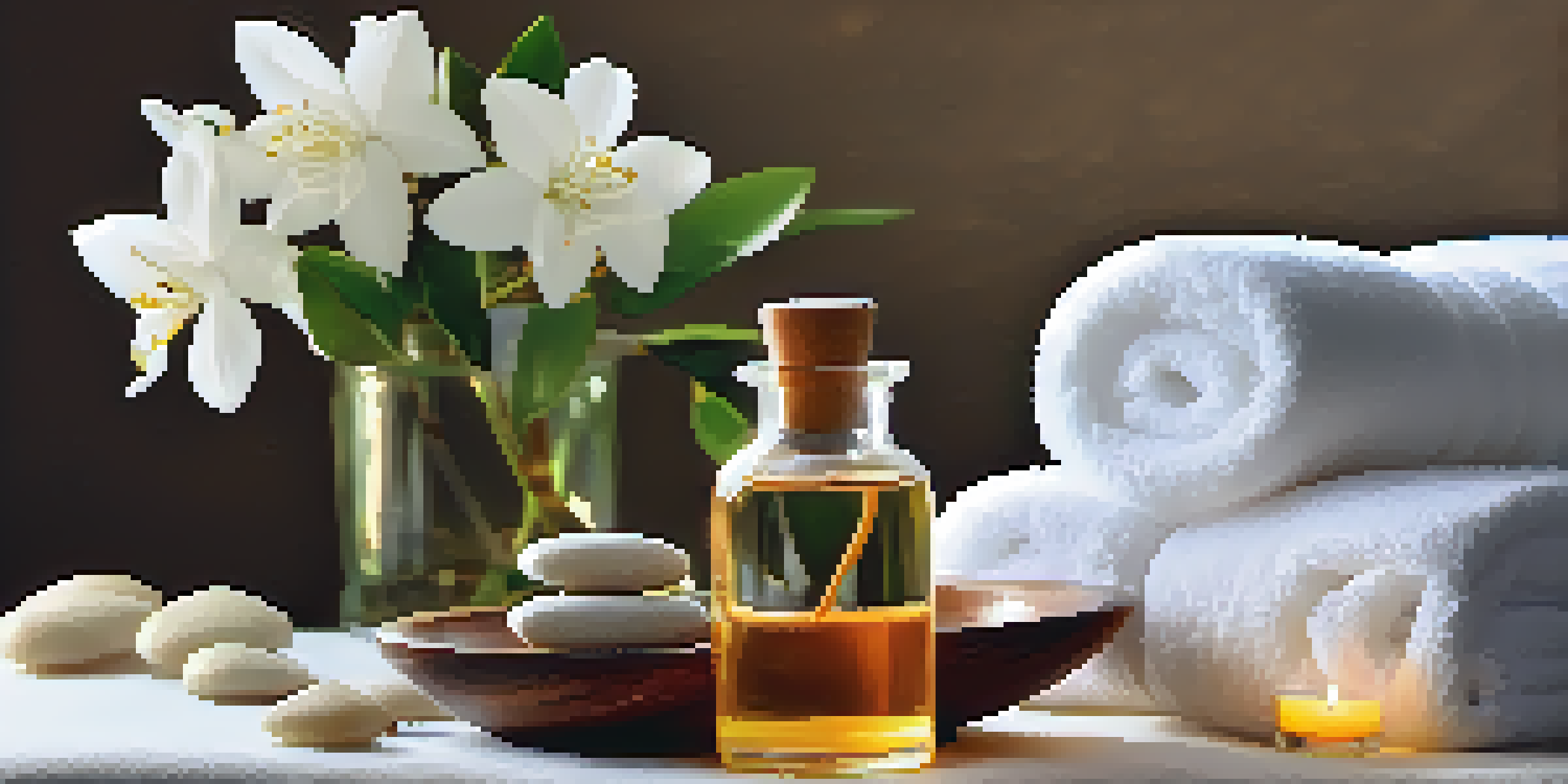Jasmine Oil: The Sensual Aromatherapy for Stress Relief

Introduction to Jasmine Oil and Its Benefits
Jasmine oil, derived from the delicate flowers of the jasmine plant, is renowned for its captivating aroma and therapeutic properties. Often used in aromatherapy, this essential oil is celebrated for its ability to promote relaxation and alleviate stress. With its rich, sweet scent, jasmine oil not only delights the senses but also offers a myriad of health benefits.
Essential oils are the lifeblood of plants, and they have the power to heal and restore balance in our lives.
Many people turn to jasmine oil for its calming effects on the mind and body. When diffused in a room or added to a warm bath, its fragrance can create a serene environment, making it easier to unwind after a long day. Moreover, jasmine's reputation as an aphrodisiac adds a sensual element, enhancing its appeal in both self-care routines and romantic settings.
As we explore the world of jasmine oil, it's important to consider its origins and how it has been utilized throughout history. From ancient cultures to modern wellness practices, jasmine has held a special place in the hearts of many, making it a timeless choice for stress relief and emotional balance.
The Science Behind Jasmine Oil's Relaxation Effects
The soothing effects of jasmine oil can be traced back to its chemical composition, which includes compounds like benzyl acetate and linalool. These components are known for their calming properties, which may help reduce anxiety and promote a sense of tranquility. This scientific backing adds credibility to jasmine oil's longstanding reputation in holistic wellness.

Research has shown that inhaling the aroma of jasmine can positively affect our mood and even lower cortisol levels, the hormone associated with stress. This is particularly beneficial for those who struggle with anxiety or feel overwhelmed by daily pressures. With just a few deep breaths of jasmine-infused air, you might find yourself feeling more at ease and centered.
Jasmine Oil Relieves Stress Naturally
Jasmine oil's soothing aroma and chemical composition promote relaxation and help reduce anxiety.
Understanding the science behind jasmine oil helps to demystify its therapeutic effects. By integrating this knowledge into your self-care routine, you can make informed choices about how to use jasmine oil effectively for stress relief and emotional well-being.
How to Use Jasmine Oil for Stress Relief
There are several ways to incorporate jasmine oil into your daily routine for stress relief. One popular method is through aromatherapy diffusers, which disperse the oil's fragrance throughout a room, creating a calming atmosphere. Just a few drops can transform your space into a peaceful haven, perfect for relaxation or meditation.
The greatest weapon against stress is our ability to choose one thought over another.
Another effective way to use jasmine oil is by adding it to your bath. Mixing a few drops with a carrier oil, such as coconut or jojoba oil, allows you to enjoy the soothing benefits while soaking in warm water. This ritual not only helps to relieve stress but also nourishes the skin, leaving you feeling refreshed and rejuvenated.
For those who prefer a more personal touch, you can create a jasmine oil massage blend. By combining jasmine oil with a carrier oil, you can enjoy a relaxing massage that melts away tension and promotes emotional well-being. This intimate practice can be a wonderful way to connect with yourself or a partner, enhancing both physical and emotional relaxation.
The Role of Jasmine Oil in Mindfulness Practices
Mindfulness practices, such as meditation and yoga, can be greatly enhanced by the use of jasmine oil. Its soothing aroma can help to ground you in the present moment, making it easier to focus your mind and let go of distracting thoughts. Incorporating jasmine oil into your practice can deepen your sense of connection to your body and breath.
Many practitioners find that using jasmine oil during meditation sessions elevates their experience. By simply diffusing the oil or applying it to pulse points, you can create an inviting atmosphere that encourages relaxation and introspection. This can lead to a more profound state of awareness and clarity during your practice.
Enhances Mindfulness Practices
Incorporating jasmine oil into meditation or yoga can deepen your focus and enhance emotional connection.
Incorporating jasmine oil into your mindfulness routine can also serve as a gentle reminder to pause and breathe throughout the day. By associating the scent of jasmine with moments of calm, you can cultivate a greater sense of peace and presence in your everyday life.
Jasmine Oil in Romantic Settings
Jasmine oil isn't just for stress relief; it also plays a significant role in creating romantic atmospheres. Its sweet, alluring scent has been cherished for centuries as a natural aphrodisiac, setting the stage for intimate moments. Whether it’s a candlelit dinner or a cozy night in, jasmine can enhance the mood and deepen connections.
Adding jasmine oil to a diffuser or a massage blend can help foster intimacy and connection between partners. The relaxing properties of jasmine can ease tension, making it easier to engage in heartfelt conversations and moments of vulnerability. This aromatic experience can transform an ordinary evening into something truly special.
By embracing jasmine oil in romantic settings, couples can create a shared sensory experience that strengthens their bond. The enchanting fragrance can serve as a catalyst for love and affection, making it a perfect addition to date nights or special occasions.
Choosing Quality Jasmine Oil for Best Results
When it comes to essential oils, quality matters. Not all jasmine oils are created equal, and choosing a high-quality product is crucial for experiencing its full benefits. Look for jasmine oil that is labeled as 100% pure and sourced from reputable suppliers to ensure authenticity and efficacy.
It's also important to consider the extraction method used for the oil. Steam distillation is the preferred method for jasmine oil, as it preserves the delicate aroma and therapeutic properties of the flowers. Avoid oils that are synthetic or diluted with fillers, as they may not provide the same stress-relieving effects.
Quality Matters in Jasmine Oil
Choosing high-quality, pure jasmine oil ensures you experience its full therapeutic benefits for stress relief.
By investing in high-quality jasmine oil, you're not only ensuring a more enjoyable experience but also maximizing its potential benefits for stress relief and emotional wellness. Taking the time to research and choose wisely can make all the difference in your aromatherapy journey.
Conclusion: Embracing Jasmine Oil for a Calmer Life
Incorporating jasmine oil into your life can be a transformative experience, offering a natural way to manage stress and enhance well-being. With its rich history and aromatic allure, jasmine has proven to be more than just a pleasant scent; it’s a powerful ally in your quest for relaxation. Whether through aromatherapy, massage, or mindfulness practices, the benefits are abundant.
As you explore the many ways to use jasmine oil, remember that self-care is a personal journey. It's about finding what resonates with you and integrating those practices into your routine. The soothing properties of jasmine can serve as a gentle reminder to prioritize your mental and emotional health.

By embracing jasmine oil, you're taking a step towards a calmer, more balanced life. So why not indulge in its enchanting fragrance? Allow jasmine to become a cherished part of your self-care rituals, and discover the serenity that awaits you.